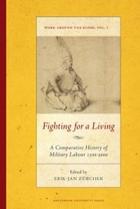
This unique volume investigates the circumstances that have produced starkly different systems of recruiting and employing soldiers in different parts of the globe over the last 500 years, on the basis of case studies from Europe, Africa, America, the Middle East and Asia. The twenty contributions to this volume undertake a systematic comparative analysis of military labour, addressing two distinct, and normally quite separate, communities: labour historians and military historians.
Published by Amsterdam University Press, issued by the International Institute of Social History, Fighting for a Living is also available online in open access at oapen.org. It is also included in the pilot project of Knowledge Unlatched, a collaborate initiative enabling open access books, helping stakeholders to work together for a sustainable open future for specialist scholarly books. This includes free access for end users, to ensure optimal availability for readers all over the world.
Historians have long overlooked the labour involved in soldiering. But now, with the publication of Fighting for a Living, the world of military workers is brought to the forefront of scholarly inquiry. The editors throw a critical shining light on the nature of war and the nature of work for the millions of individuals who have contributed their labour, and often their lives, for the militaries of the world.
- Nathan Wise, School of Humanities, University of New England, Australia
Fighting for a living is the first volume of the new book series Work around the Globe: Historical Comparisons and Connections, published by Amsterdam University Press.
Most human beings work, and are exposed to labour markets. These markets are increasingly globally competitive and cause both capital and labour to move around the world. Understanding these developments and their consequences in the world of work and labour relations requires sound historical research, based on the experiences of different groups of workers in different parts of the world at different moments in time, throughout human history. This new series offers a high-quality, peer-reviewed publication platform for the results of research in this topical field.
